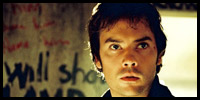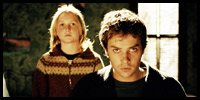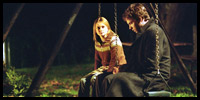
 |
|
Boogeyman (2005) Cast: Barry Watson, Emily Deschanel, Skye McCole Bartusiak, Tory Mussett, Charles Mesure, Lucy Lawless, Andrew Glover 2005 – 86 minutes Rated: Reviewed by Dustin Putman, February 4, 2005.  It may only be the first week of February, but 2005 has already signaled a stunning and disheartening decline in the quality of horror releases. January brought the crummy, sometimes downright abysmal, likes of "White Noise," "Alone in the Dark," and "Hide and Seek." February shows no signs of improvement with "Boogeyman," a chill-free, suspense-deficient thriller that is not only an enormous waste of time and film stock, but also insanely empty and heavy-handed. This is truly incompetent filmmaking from all angles, and, if director Stephen Kay (2000's "Get Carter") is a step above Ed Wood-successor Uwe Boll—he of 2003's "House of the Dead" and the aforementioned "Alone in the Dark"—that step is a bit too inconsequential an incline for comfort.
It may only be the first week of February, but 2005 has already signaled a stunning and disheartening decline in the quality of horror releases. January brought the crummy, sometimes downright abysmal, likes of "White Noise," "Alone in the Dark," and "Hide and Seek." February shows no signs of improvement with "Boogeyman," a chill-free, suspense-deficient thriller that is not only an enormous waste of time and film stock, but also insanely empty and heavy-handed. This is truly incompetent filmmaking from all angles, and, if director Stephen Kay (2000's "Get Carter") is a step above Ed Wood-successor Uwe Boll—he of 2003's "House of the Dead" and the aforementioned "Alone in the Dark"—that step is a bit too inconsequential an incline for comfort.
 Fifteen years after witnessing his father's death at the hands of a monster in the closet, 23-year-old Tim Jensen (Barry Watson) has yet to fully recover from the traumas of his childhood. When his mother (Lucy Lawless) suddenly dies, Tim returns to his quiet hometown for the funeral and finds himself catching up with old friend Kate (Emily Deschanel). Asininely instructed to spend a night in his old house as a way of dealing with his past, Tim is soon face to face with the title boogeyman who lives in the shadows and feeds off of people's fear.
Fifteen years after witnessing his father's death at the hands of a monster in the closet, 23-year-old Tim Jensen (Barry Watson) has yet to fully recover from the traumas of his childhood. When his mother (Lucy Lawless) suddenly dies, Tim returns to his quiet hometown for the funeral and finds himself catching up with old friend Kate (Emily Deschanel). Asininely instructed to spend a night in his old house as a way of dealing with his past, Tim is soon face to face with the title boogeyman who lives in the shadows and feeds off of people's fear.
 Derivative of 2002's "They" and 2003's "Darkness Falls," two minor efforts that are works of cinematic brilliance in comparison, "Boogeyman" is chintzy-looking and criminally lame. The ultimate goal of building uneasiness through its relatable premise of common nighttime childhood apprehension is squandered by a long, unflagging series of storytelling and technical missteps. Instead of slowly building palpable dread out of nightmarish situations—think 2002's "The Ring" and 2004's "The Grudge"—director Stephen Kay mistakes cheap jump-scares, arriving approximately once per scene, for actual frights. There isn't one that works. He and cinematographer Bobby Bukowski (2004's "Saved!") also use the camera to disastrous effect, haphazard in their rudimentary handling of establishing shots and annoyingly muddled in their reliance on zoom-ins and outs. Furthermore, the camera is so shaky during the action scenes and the editing by John Axelrad (2001's "What's the Worst That Could Happen?") so choppy that all potential scares are stifled by sheer incomprehensibility.
Derivative of 2002's "They" and 2003's "Darkness Falls," two minor efforts that are works of cinematic brilliance in comparison, "Boogeyman" is chintzy-looking and criminally lame. The ultimate goal of building uneasiness through its relatable premise of common nighttime childhood apprehension is squandered by a long, unflagging series of storytelling and technical missteps. Instead of slowly building palpable dread out of nightmarish situations—think 2002's "The Ring" and 2004's "The Grudge"—director Stephen Kay mistakes cheap jump-scares, arriving approximately once per scene, for actual frights. There isn't one that works. He and cinematographer Bobby Bukowski (2004's "Saved!") also use the camera to disastrous effect, haphazard in their rudimentary handling of establishing shots and annoyingly muddled in their reliance on zoom-ins and outs. Furthermore, the camera is so shaky during the action scenes and the editing by John Axelrad (2001's "What's the Worst That Could Happen?") so choppy that all potential scares are stifled by sheer incomprehensibility.
 The plot, too, in a shapeless screenplay that took three people to mess up—Eric Kripke, Juliet Snowden, and Stiles White—is wretchedly realized and so gaping with holes that it resembles a giant slice of swiss cheese. Why, after fifteen years of relative normalcy, is Tim suddenly revisited by the boogeyman? Who, or what, is the boogeyman, anyway? While an air of remaining mystery is always better in horror films than having things spelled out for audiences, there should at least be some sort of an explanation as to what the villain is, what its motive is, and how, exactly, it kills. Several people throughout "Boogeyman" suggestively meet a grisly fate, but, as a nondescript PG-13 feature flirting the lines of a PG, none of the deaths are seen and no mention is made of where the victims end up once they die—they simply disappear.
The plot, too, in a shapeless screenplay that took three people to mess up—Eric Kripke, Juliet Snowden, and Stiles White—is wretchedly realized and so gaping with holes that it resembles a giant slice of swiss cheese. Why, after fifteen years of relative normalcy, is Tim suddenly revisited by the boogeyman? Who, or what, is the boogeyman, anyway? While an air of remaining mystery is always better in horror films than having things spelled out for audiences, there should at least be some sort of an explanation as to what the villain is, what its motive is, and how, exactly, it kills. Several people throughout "Boogeyman" suggestively meet a grisly fate, but, as a nondescript PG-13 feature flirting the lines of a PG, none of the deaths are seen and no mention is made of where the victims end up once they die—they simply disappear.
 There are more pressing questions that go unanswered. Why, for example, does Tim even have to defeat the boogeyman, and, once he does, does that mean all people all over the world are free of being haunted? Why is Tim's tiny country hometown the seeming epicenter of the boogeyman, complete with countless notices throughout the years of children disappearing? And, during the anticlimactic finale that goes by so fast and is so unsatisfyingly concocted as to seem like a disposable fever-dream, how is Tim able to travel through the universe's time continuum and wind up in different places from the near-past simply to satisfy the needs of the screenplay? For a premise so simple, the only way the narrative could have made less sense is if it featured an impromptu trip to the rodeo.
There are more pressing questions that go unanswered. Why, for example, does Tim even have to defeat the boogeyman, and, once he does, does that mean all people all over the world are free of being haunted? Why is Tim's tiny country hometown the seeming epicenter of the boogeyman, complete with countless notices throughout the years of children disappearing? And, during the anticlimactic finale that goes by so fast and is so unsatisfyingly concocted as to seem like a disposable fever-dream, how is Tim able to travel through the universe's time continuum and wind up in different places from the near-past simply to satisfy the needs of the screenplay? For a premise so simple, the only way the narrative could have made less sense is if it featured an impromptu trip to the rodeo.
 There once was a time when the horror genre was made for adult viewers and actually gave them reasons to leave the lights on at night. No more, or very rarely. In an era where quality is buried beneath the importance of the almighty Hollywood dollar and R-rated movies are compromised artistically and chopped up into PG-13 mutilations of their true selves, "Boogeyman" has fallen victim to all of the above and appears to have been made by children, too. The dedicated performances from Barry Watson (2002's "Sorority Boys") and Emily Deschanel (2004's "The Alamo") are swallowed whole by the hammy horror cliches on display, and their characters are helplessly underwritten. The purpose of young Skye McCole Bartusiak (2004's "Against the Ropes") as Franny, a neighbor girl who befriends Tim, is so glaringly obvious from her first appearance that, when the mystery is revealed, it is laughable. All other actors should be relieved to go unmentioned.
There once was a time when the horror genre was made for adult viewers and actually gave them reasons to leave the lights on at night. No more, or very rarely. In an era where quality is buried beneath the importance of the almighty Hollywood dollar and R-rated movies are compromised artistically and chopped up into PG-13 mutilations of their true selves, "Boogeyman" has fallen victim to all of the above and appears to have been made by children, too. The dedicated performances from Barry Watson (2002's "Sorority Boys") and Emily Deschanel (2004's "The Alamo") are swallowed whole by the hammy horror cliches on display, and their characters are helplessly underwritten. The purpose of young Skye McCole Bartusiak (2004's "Against the Ropes") as Franny, a neighbor girl who befriends Tim, is so glaringly obvious from her first appearance that, when the mystery is revealed, it is laughable. All other actors should be relieved to go unmentioned.
 When "Boogeyman" ends, no element of the plot has yet been clarified or developed, no scares have yet been generated, and sorely cheated reactions from viewers not believing the inadequacies of what they have just seen will be the name of the game. There is one grisly moment—a car accident involving a black crow—that suggests what the film could have been; it is the only moment of foreboding that feels genuine in all 86 minutes. A huge cinematic wasteland, and a condescending one at that, "Boogeyman" is direct-to-video fare in fancy, unworthy theatrical duds. Rarely does one find a studio horror film this transparent, empty, and inconsiderate of its own initial promise.
When "Boogeyman" ends, no element of the plot has yet been clarified or developed, no scares have yet been generated, and sorely cheated reactions from viewers not believing the inadequacies of what they have just seen will be the name of the game. There is one grisly moment—a car accident involving a black crow—that suggests what the film could have been; it is the only moment of foreboding that feels genuine in all 86 minutes. A huge cinematic wasteland, and a condescending one at that, "Boogeyman" is direct-to-video fare in fancy, unworthy theatrical duds. Rarely does one find a studio horror film this transparent, empty, and inconsiderate of its own initial promise.
|
© 2008 by Dustin Putman |














